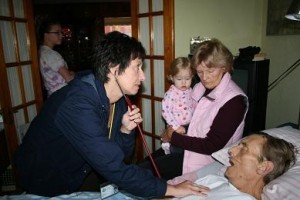So far, I’ve had seventeen years as a child, four years as a college student, three years as a working single, forty years as a married woman and one month as a widow. The lion’s share of my life has been spent thinking like a wife, and I know with certainty one month isn’t long enough to think single again.
In answering people’s questions, I’m still using “we” instead of “I”, even though the other half of my “we” is gone. Saying “I” reminds me of a line from an old song, “One is the loneliest number that you’ll ever do.” Back when I was single, I didn’t feel lonely at all, but having been a couple for so long, suddenly I feel it.
Today I sent an anniversary card to some dear friends. Despite our anniversary coming and going with only half of us here, it wasn’t difficult to celebrate with another couple still in tact. The hard part came when I signed the card. The words, “Love, Margaret and Nate” rolled right out of my pen before I could stop them. It’s hard to remember to sign from just me.
But the worst adjustment is learning to talk about Nate in the past tense. I catch myself saying, “Nate loves holiday ties,” then needing to correct myself. “Nate loved holiday ties.” It’s almost not worth saying at all.
Other things must change, too. When my cousin Calvin was here at the time of the funeral, he gently reminded me that the categories of our marriage Nate used to handle will now have to be handled by me. For instance, Nate always made the coffee, put salt in the softener, arranged the vacations and handled insurance policies. My cousin told me, “If you can’t do what Nate used to do, ask someone to help you, so those things aren’t left undone. But you can do a lot of it yourself.” The problem comes in even noticing what needs doing when you haven’t done those things for forty years.
While Calvin was here, we left the house for several hours and returned to find seven big candles still burning on the mantle. Nate would never have stepped out the door without first blowing them out, but I didn’t even notice.
Calvin also said, “I know Nate made sure the house was locked up each night. Are you doing that?”
It hadn’t occurred to me. Actually, the house hadn’t been locked for two months. My cousin was right. I had to wonder what else was undone because of Nate’s absence. I remembered back to Thanksgiving and realized I’d invited all the same people as always but neglected to give anyone an arrival time. Nate had always done that with phone calls, touching base with each one ahead of time. Our guests ended up calling and texting me that morning asking, “What time is dinner?”
The day after Thanksgiving it occurred to me we hadn’t talked to the far-away relatives we usually call on each holiday, and of course the reason was that Nate always did the phoning. I might take a turn on each call, but he was the one who remembered to initiate them.

Nate also was my news informant. He read four newspapers every day: The Chicago Tribune, The Daily Herald, The Wall Street Journal and The New York Times. He gave me the condensed version, wanting to talk current events. Since Nate’s death, I’ve been woefully uninformed. We don’t have television at the cottage and can’t get a clear radio signal, so I haven’t seen or heard a newscast in weeks. This was never a problem, with Nate keeping me up to date.
These are the little surprises of widowhood. Piled one on top of another, they make for a sad day. Solved one at a time, they bring hope.
“For the Lord grants wisdom! He grants a treasure of common sense to the honest. For wisdom will enter your heart, and knowledge will fill you with joy. Wise choices will watch over you. Understanding will keep you safe.” (Proverbs 2:6,7,10-11)


